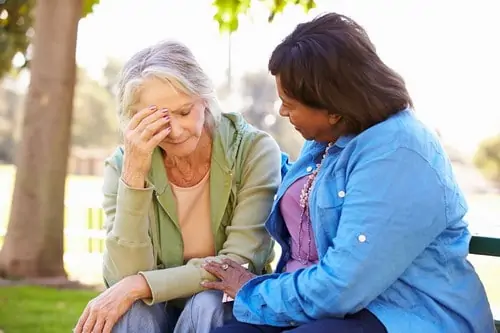
“In order for us to completely know life, we need to become comfortable with death – starting with feelings about our own death! Woody Allen once said, “I am not afraid of death; I just don’t want to be there when it happens!” Our culture has lost its relationship with death, and we need to reclaim it individually.”
William Peters, Shared Crossing Project
If we can consciously face our own concepts about death before the immanent death of a loved one, then we can be fully present and cherish the time that we have to spend with them and use that time to express our love, clear old regrets, and resolve unfinished business.
The death of someone we love is one of the most devastating and emotionally trying experiences that we may ever endure. Most of us don’t understand how someone can just be gone in an instant, and we don’t have a belief system or idea of an afterlife to support us in our darkest times. In this regard, even entertaining the idea of death, before it occurs, has value. We can start to gain peace of mind before a tragic loss.
Signs from the other Side
I am personally convinced that death does not end our relationship with a person. Loved ones may not be visible or within our reach, but their impact ripples through the world around us, forever affecting the way in which we experience our lives.
I have heard many stories from the people I work with of signs that their beloved is still aware of what is happening in their life and that they are in a good place. Sometimes these signs come in the form of birds, dolphins, butterflies, or other messengers from the animal world who magically appear at just the right time. Other times, a physical hello from the other side comes in the form of a billboard, license plate, or a random sentence heard in passing. Professional mediums, who are open to the other side, can give proof of the existence of the afterlife through accurate messages, which can bring comfort during a time of grief.
What Happens After Death?
Alongside the grief that comes with a loved one’s passing, our own beliefs and questions about the afterlife come up, such as: What comes after death? Is there a Heaven? A Hell? Does the soul reincarnate?
After my own Near Death Experience, and having listened to the Near Death Experiences of many others, I know that we are not the body, and that dying is like changing clothes. I am convinced that there is an afterlife and that we will meet our beloved ones on the other side when we cross over. Many people, however, do not share this belief. For them, the thought that they will never see or talk to their loved one again is devastating.
When dealing with intense grief, it is important to find a support group or a therapist who understands the pain of loss from their own direct experience. The support of someone who has also been through all the stages of grief is invaluable, and it can give you hope that you also can continue on in life. If you find yourself longing for death to end the pain of grief, it is a sure sign to ask for help from a professional. Hospice offers grief support groups in every major city, and they use experienced professionals who are comfortable talking about death.
What You Can Feel, You Can Heal
It is important to allow yourself time to acknowledge and be with the rollercoaster of feelings that come with the loss of a loved one. These feelings include guilt, regret, depression, numbness, anger and, sometimes, even relief. Often, after a sudden death, the immediate necessity of dealing with logistics – planning the funeral, communicating with relatives, contacting banks, hiring lawyers, filling out paperwork – takes over all of our time. We push these feelings aside in order to function. Then, months later, they come up and we feel much worse. Having a compassionate helper witness these feelings allows them to dissipate in a safe and loving environment.
Grief is physically and emotionally draining. I have found that the addition of energy healing work can restore physical vitality and bring back the zest for life. If you or someone you know needs help recovering from loss, I am a trustworthy guide in this arena. My own recovery from loss (7 loved ones over the past 5 years, including my beloved cat), has given me much compassion and patience for the process of healing.
I can be reached through my website: www.daniantman.com and offer grief recovery healing sessions.
Another wonderful resource to become more familiar with death is the Shared Crossing Project. They offer workshops and programs to cultivate a life-affirming relationship with death.

Recent Comments